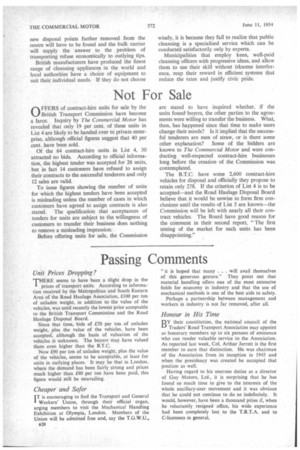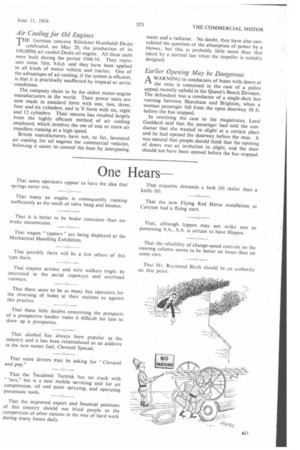Passing Comments
Page 54

Page 55

If you've noticed an error in this article please click here to report it so we can fix it.
Unit Prices Dropping?
THERE seems to have been a slight drop in the prices of transport units. According to information received by the Metropolitan and South Eastern Area of the Road Haulage Association, £100 per ton of unladen weight, in addition to the value of the vehicles, was until recently the lowest price acceptable to the British Transport Commission and the Road Haulage Disposal Board.
Since that time, bids of £70 per ton of unladen weight, plus the value of the vehicles, have been accepted, although the basis of valuation of the vehicles is unknown. The buyers may have valued them even higher than the B.T.C.
Now £90 per ton of unladen weight, plus the value of the vehicles, seems to be acceptable, at least for units in outlying places. It may be that in London, where the demand has been fairly strong and prices much higher than £90 per ton have been paid, this figure would still be unavailing.
Cheaper and Safer
IT is encouraging to find the Transport and General I Workers' Union, through their official organ, urging members to visit the Mechanical Handling Exhibition at Olympia, London. Members of the Union will be admitted free and, say the T.G.W.U.,
B20 "it is hoped that many . . . will avail themselves of this generous gesture." They point out that material handling offers one of the most extensive fields for economy in industry and that the use of mechanical methods is one of the best aids to safety.
Perhaps a partnership between management and workers in industry is not far removed, after all.
Honour in His Time
BY their constitution, the national council of the
Traders' Road Transport Association may appoint as honorary members up to six persons of eminence who can render valuable service to the Association. As reported last week, Col. Arthur Jerrett is the first member to earn that distinction. He was chairman of the Association from its inception in 1945 and when the presidency was created he occupied that position as well.
Having regard to his onerous duties as a director of Guy Motors, Ltd., it is surprising that he has found so much time to give to the interests of the whole ancillary-user movement and it was obvious that he could not continue to do so indefinitely. It would, however, have been a thousand pities if, when he reluctantly resigned office, his wide experience had been completely lost to the T.R.T.A. and to C-licensees in general.
Air Cooling for Oil Engines
THE German concern Kitickner-Hurriboldt-Deutz celebrated, on May 20, the production of its 100.000th air-cooled Deutz oil engine. All these units were built during the period 1948-54. They represent some Sm. b.h.p. and they have been applied to all kinds of motor vehicle and tractor. One of the advantages of air cooling, if the system is efficient, is that it is practically unaffected by tropical or arctic conditions.
The company claim to be the oldest motor-engine manufacturers in the world. Their power units are now made in standard form with one, two, three, four and six cylinders, and in V-form with six, eight and 12 cylinders. Their success has resulted largely from the highly efficient method of air cooling employed, which involves the use of one or more air impellers running at a high speed.
British manufacturers have not, so far, favoured air cooling for oil engines for commercial vehicles, believing it easier to control the heat by interposing water and a radiator. No doubt, they have also considered the question of the absorption of power by a blower, but this is probably little more than that taken by a normal fan when the impeller is suitably designed.
Earlier Opening May be Dangerous
A WARNING to conductors of buses with doors at 1-1 the exits is contained in the case of a police appeal recently upheld in the Queen's Bench Division. The defendant was a conductor of a single-deck bus running between Shoreham and Brighton, when a woman passenger fell from the open doorway 30 ft. before the bus stopped.
In remitting the ease to the magistrates, Lord Goddard said that the passenger had told the conductor that she wanted to alight at a certain place and he had opened the doorway before the stop. It was natural that people should think that the opening of doors was an invitation to alight, and the door should not have been opened before the bus stopped.




















































































































































